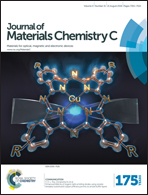Green synthesis of Cu micro/nanoparticles for low-resistivity Cu thin films using ascorbic acid in aqueous solution†
Abstract
Nanometer- and micrometer-sized Cu particles were synthesized with 100% yield by chemically reducing aqueous Cu–citric acid complexes using ascorbic acid as a reducing agent instead of the commonly employed toxic reducing agents. Surface analysis revealed that the surfaces of the Cu nanoparticles were modified by citric acid, and Na ions remained on the surfaces as impurities. Since the impurities, rather than surface oxide layers, prevented the sintering of the Cu nanoparticles, the resistivity of the thin films prepared using the Cu nanoparticles was decreased by reducing the number of impurities. In addition, the well-packed particulate structure obtained by mixing Cu nanoparticles and Cu microparticles facilitated sintering. We demonstrated that the resistivity of the Cu films prepared using Cu nanoparticles by heat treatment at 300 °C under Ar gas flow was improved from 470 to 8.2 μΩ cm by reducing the number of Na ions on the surfaces and mixing the Cu NPs with Cu microparticles.


 Please wait while we load your content...
Please wait while we load your content...